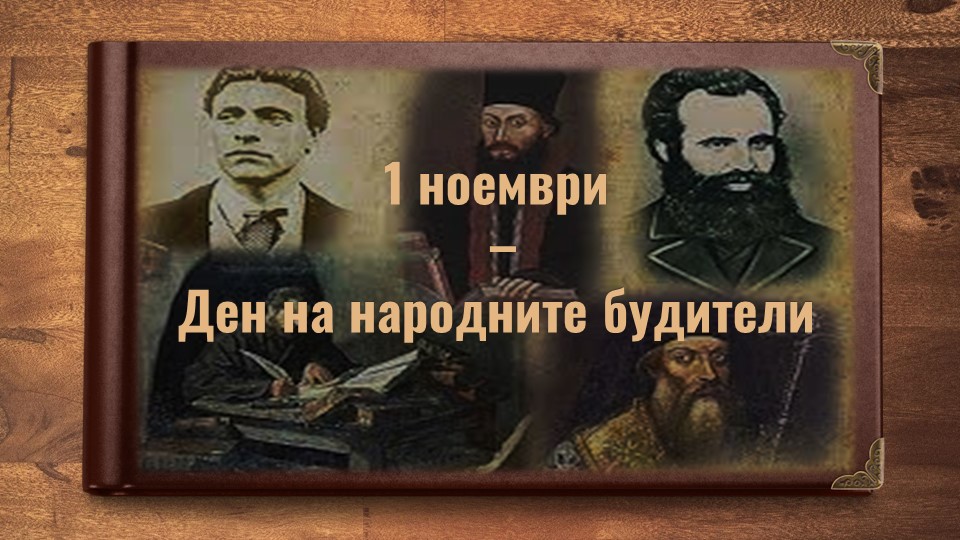"Enough sleep already." Get up! Christmas Day has come…” – Petko Slaveikov 1886
November 1 is celebrated as the Day of People's Awakeners. The holiday is dedicated to the work of writers, educators, fighters for national liberation and all those who have preserved the spiritual values of the people over the centuries.
Bulgaria is now free. From the intelligentsia to the common man in the village, everyone is aware of the feats that writers and revolutionaries have recently performed to awaken the dormant spirit of the Bulgarian and lead him to freedom. En masse in cities and villages, people want to pay tribute to these educators and revolutionaries and start naming streets, schools and community centers after them. In 1922, the then Minister of Public Education, Stoyan Omarcevski, submitted a proposal to the Council of Ministers to designate November 1 as a day for people's educators. Minister Omarcevski says: "...our first concern is to turn the eyes of our youth to everything valuable and bright from our past and to associate her with this past, so that she may draw from it cheerfulness and confidence, strength and impulse to activity and creativity. Our youth must know that life is only valuable when it is inspired by idealism, by aspiration; only then is life meaningful and meaningful, when it is overwhelmed by idealism, when souls and hearts tremble for the beautiful, the national, the ideal, and this is embedded in the images and creations of all those of our actors who awakened our people in the days of their slavery, which led him to enlightenment and national freedom during the Renaissance and which created eternal cultural values for him during his free life... The Ministry of Public Education designates November 1, the day of St. John of Rila, as a holiday for Bulgarian revivalists, for a holiday, let's call it, of the great Bulgarians, through which a holiday, arranged in a planned and systematic way, to unite all efforts in this direction, as this day turns into a cult of the Bulgarian national genius: paying tribute to the memory of the people's awakeners, to those who, as selfless warriors, led the Bulgarian people in the past to enlightenment, to freedom, to culture, to inspire the youth through their bright images to national and cultural ideals."
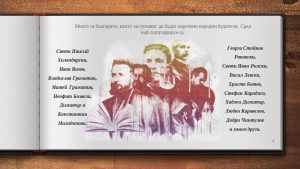 This holiday was celebrated for the first time in 909 in Plovdiv, and from 1921 to 1945 it was a national holiday.
This holiday was celebrated for the first time in 909 in Plovdiv, and from 1921 to 1945 it was a national holiday.
There are many Bulgarians who deserve to be called people's awakeners. Among the most popular are Saints Paisius Hilendarski, Ivan Vazov, Grigoriy Tsamblak, Konstantin Kostenechki, Vladislav Gramatik, Matei Gramatik, Saint Ivan Rilaski, Neofit Bozveli, brothers Dimitar and Konstantin Miladinovi, Georgi Stoykov Rakovski, Vasil Levski, Hristo Botev, Stefan Karadzha, Hadji Dimitar, Lyuben Karavelov, Dobri Chintulov and many others.
He is the patron saint of folk revivalists St. Ivan Rislki. The Christian Church honors the saint on Father's Day - October 19 or November 1 in the old style. Born around 876 in Kyustendilsko, died on August 18, 946, he founded the largest monastery in our country - the Rila Monastery. He lived during the time of one of our greatest rulers, kings Boris I, Simeon the Great and Samuel, and even then he was known for his miracles. He became a monk early, only at the age of 25. From Vlahina planina, where he was educated, he went to Vitosha and finally secluded himself in Rila. There he founded the monastery with his followers. Ivan healed infirm and barren people. People tell how Tsar Peter I traveled the entire 440 km from the capital Veliki Preslav to Rila to meet the famous healer, who brought him a lot of gold and gifts, which the healer refused. His relics are also known to be miraculous and today hundreds of people flock to the holy abode to seek healing from the saint.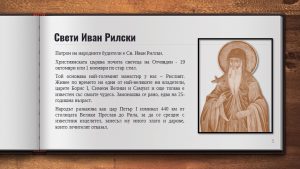
Shortly before his death, he retired to a cave near the monastery. He wrote his testament there - on March 25, 941. They also apply outside the context of instruction to monks:
"And above all beware of the covetous serpent, for covetousness is the root of all evil"
"Say not what we shall eat, or what we shall drink, or what we shall wear...Look at the birds of the air, how they do not sow, nor reap, nor gather in grain"
"... and you try to live with one mind and one mind... Dormitory residence is more beneficial in many things"
"Do not seek championships and superiors"
"As you live together for the Lord's sake and bear one another's burdens, do not neglect those who live in solitude..."
"Handwork not to be neglected by you"
When we celebrate people's rousers, we think almost entirely of brave, well-read, restless and uncompromising in their cause...men. Because men act in the public space, and women rule at home - mothers, housewives, keepers of family memory. There are many women who did not want to come to terms with the generally accepted role assigned to them by society at the time. They felt in themselves strength and courage, a calling for great deeds, and not a life confined within the walls of the yard and the house. Unfortunately, female vigilantes remain in the shadows because there are no photos, sources and documents about their deeds. A large part of them practiced one of the few decent female professions for the time - that of a teacher. They educated the young girls, who, feeling the power of knowledge and words, in turn became teachers and spread knowledge and culture, created libraries, developed charity work.
THE WAKE-UP WOMEN
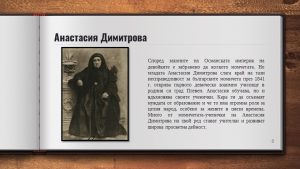 According to the laws of the Ottoman Empire, girls were forbidden to marry as much as boys. But the young one Anastasia Dimitrova put an end to this injustice for Bulgarian girls, in 1841 she opened the first girls' mutual school in her hometown of Pleven. Anastasia teaches, but also inspires her students. It makes them realize the need for education and that it has a huge role for the whole people, especially for women in those times. Many of the girl students of Anastasia Dimitrova in turn became teachers and developed extensive educational activities. Tsveta Krastenyakova, Parashkeva Neikova - opened the first girls' school in Lovech, and a number of other alert and brave women put an end to ignorance after the middle of the 19th century. to the left, but walk on the king's road.'
According to the laws of the Ottoman Empire, girls were forbidden to marry as much as boys. But the young one Anastasia Dimitrova put an end to this injustice for Bulgarian girls, in 1841 she opened the first girls' mutual school in her hometown of Pleven. Anastasia teaches, but also inspires her students. It makes them realize the need for education and that it has a huge role for the whole people, especially for women in those times. Many of the girl students of Anastasia Dimitrova in turn became teachers and developed extensive educational activities. Tsveta Krastenyakova, Parashkeva Neikova - opened the first girls' school in Lovech, and a number of other alert and brave women put an end to ignorance after the middle of the 19th century. to the left, but walk on the king's road.'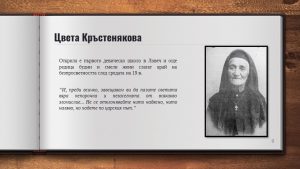
Stanislava Petkova Karaivanova-Balkanova
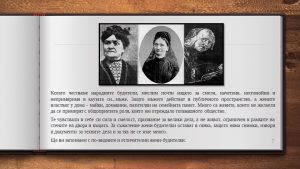 Daughter of the famous Grandma Nedelya (Nedelya Petkova). Born in Sopot, Levski's maternal cousin, in 1872, Stanislava Petkova was the first teacher in Bitola and a participant in the "Bulgarian Rose" movement. Develops educational and revolutionary activity. At the beginning, she taught at home, there were 102 female students, but their number is constantly growing, because their families realize how important it is to preserve their Bulgarian self-awareness. After she was forced to close her school under Greek influence, she went to Ohrid with her mother and continued to teach there. Then in Voden, Thessaloniki, Kriva Palanka... She and her mother sewed the flag for the Razlov Uprising, part of the April Uprising. After liberation, she continued to educate young girls in the girls' school in Kyustendil. She also works as a telegraph operator in Tsaribrod. He died in 1926 in Sofia at the age of 68.
Daughter of the famous Grandma Nedelya (Nedelya Petkova). Born in Sopot, Levski's maternal cousin, in 1872, Stanislava Petkova was the first teacher in Bitola and a participant in the "Bulgarian Rose" movement. Develops educational and revolutionary activity. At the beginning, she taught at home, there were 102 female students, but their number is constantly growing, because their families realize how important it is to preserve their Bulgarian self-awareness. After she was forced to close her school under Greek influence, she went to Ohrid with her mother and continued to teach there. Then in Voden, Thessaloniki, Kriva Palanka... She and her mother sewed the flag for the Razlov Uprising, part of the April Uprising. After liberation, she continued to educate young girls in the girls' school in Kyustendil. She also works as a telegraph operator in Tsaribrod. He died in 1926 in Sofia at the age of 68.
Yordanka Filaretova - "The Lady"
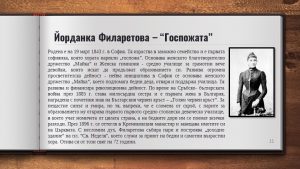 She was born on March 19, 1843 in Sofia. She grew up in a wealthy family and was the first Sofia woman whom people called "ma'am". She founded the women's charitable society "Mother" and the Women's High School - a secondary school for already literate girls who want to continue their education. She entered the newly opened girls' school of the educational activist Sava Filaretov in Sofia and married him at the age of 17. Alert and intelligent, after her husband's death she continues his educational work.
She was born on March 19, 1843 in Sofia. She grew up in a wealthy family and was the first Sofia woman whom people called "ma'am". She founded the women's charitable society "Mother" and the Women's High School - a secondary school for already literate girls who want to continue their education. She entered the newly opened girls' school of the educational activist Sava Filaretov in Sofia and married him at the age of 17. Alert and intelligent, after her husband's death she continues his educational work.
Yordanka Filaretova develops a huge educational activity. In 1869, on her initiative, the women's society "Mother" was founded in Sofia, which supports poor children, opens and maintains schools, holds fairy tales, encourages and supports those who wish to learn. While she was the chairman of the company in the period 1869-1877, she also developed and financed revolutionary activities. Despite the collapse of the April Uprising and the death of the Apostle, her spirit did not break and she continued her work. During the Serbo-Bulgarian War in 1885, she became a Sister of Mercy and was the first woman in Bulgaria to be awarded the honorary sign of the Bulgarian Red Cross - "Big Red Cross". Unfortunately, her son dies, but she, despite being broken by grief, with the money for his education, opens the first secondary economic girls' school, where girls from all over the country study, and the poor even have all expenses covered. In 1896, he retired to the Kremikov monastery and bequeathed his properties to the Church. With an indomitable spirit, Filaretova collected money and built a "profitable building" on St. Sunday', which serves as a shelter for poor and lonely elderly people. There he spent the rest of his life until April 25, 1915. He left this world at the age of 72.
Rada Kazaliyska
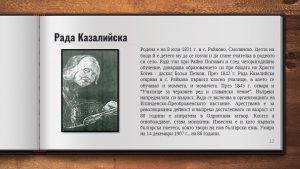 She was born on July 8, 1821 in the village of Raykovo, Smolyansk. Her father is a merchant and when he learned that new Bulgarian schools were opened in Karlovo and Kalofer, he sent his daughter to Karlovo. His goal is for his child to study and become a teacher in her home village. Rada studied under Raino Popovich and after four years of study, completed her education under Hristo Botev's father - daskal Botjo Petkov. In 1842, Rada Kazaliyska opened the first grade school in the Rhodope Mountains in the village of Raykovo, where both boys and girls were educated. In 1845, he also opened an evening school, "School of Church Order and Slavic Singing". It was only at the age of 21 that Rada managed to gradually replace the Greek language and replace it with Bulgarian in teaching. Despite her advanced age, Rada became involved in the organization of the Ilinden-Preobrazhensky Uprising. She was arrested for revolutionary activity and, despite her venerable age of 80, was sent to the Edirne prison. When she is released, she becomes a nun. She is also known as the first Bulgarian poet who wrote in the new Bulgarian language. He died on December 14, 1907, aged 86.
She was born on July 8, 1821 in the village of Raykovo, Smolyansk. Her father is a merchant and when he learned that new Bulgarian schools were opened in Karlovo and Kalofer, he sent his daughter to Karlovo. His goal is for his child to study and become a teacher in her home village. Rada studied under Raino Popovich and after four years of study, completed her education under Hristo Botev's father - daskal Botjo Petkov. In 1842, Rada Kazaliyska opened the first grade school in the Rhodope Mountains in the village of Raykovo, where both boys and girls were educated. In 1845, he also opened an evening school, "School of Church Order and Slavic Singing". It was only at the age of 21 that Rada managed to gradually replace the Greek language and replace it with Bulgarian in teaching. Despite her advanced age, Rada became involved in the organization of the Ilinden-Preobrazhensky Uprising. She was arrested for revolutionary activity and, despite her venerable age of 80, was sent to the Edirne prison. When she is released, she becomes a nun. She is also known as the first Bulgarian poet who wrote in the new Bulgarian language. He died on December 14, 1907, aged 86.
"The awakener is not an intellectual according to the European model. This is a Bulgarian spiritual category. To be a wake-up call, intellectual authority is not enough. You must have the added value of valor, courage and dedication. The Awakeners are the missionaries of culture, morality and freedom. Some wake up with their talent, others with an example. Some write books and act on the theater stage, and others write history and carry their role worthily on the stage of life. "
— Rumen Radev, President of the Republic of Bulgaria, 2018
© 2023 Iliana Dechkova

